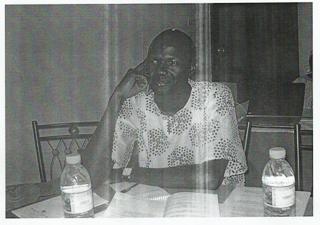S. Sudan: Rights group renews calls for justice six months after Isaiah Abraham’s death
July 5, 2013 (JUBA) – Six months after the murder of a prominent opinion writer, a South Sudanese rights group has renewed calls for the government to bring his killers to justice.

Abraham, whose full name was Isaiah Diing Abraham Chan Awuol, was murdered by unknown armed persons on the night of 5 December 2012 at his home in a suburb of the capital, Juba.
The outcry that followed led to the government to promise a swift and thorough investigation, but six months on, no progress has been made on the case.
At the time, people close the Abraham and some activists accused elements of South Sudan’s security services of involvement in the murder. The government has, however, denied this, although murder has been a major embarrassment to the ruling SPLM and contributed to the new nation’s poor rankings in press freedom and failed states indexes this year.
South Sudan celebrates its second independence anniversary on 9 July, but attacks on the press are becoming more frequent according to media freedom groups.
In the five months after Abrahm’s murder the Committee to Protect Journalists (CPJ) “documented at least 12 cases of attacks, harassment, and detention of journalists in South Sudan. In all but two of the cases, security officials were the perpetrators. Security agents, including police, have routinely harassed, intimidated, and occasionally detained journalists.”
In a May letter to president Salva Kiir, CPJ expressed “deep concern about the deteriorating state of press freedom” in the world’s youngest nation, which fought for independence on the basis of securing liberty for South Sudanese after decades of conflict with various Khartoum governments.
In a statement marking six months since Abraham’s murder, one of South Sudan’s most vocal human rights groups said that the government still had many questions to answer over the case.
The South Sudan Human Rights Society for Advocacy (SSHURSA) said that it “strongly believes that the answers lie with the Government of South Sudan.”
“In the interest of justice and due process of the law, it would be proper to have the government answer” questions about the case “in a clear and frank language”, which it had so failed to do so, the advocacy group said.
South Sudan’s information minister Barnaba Marial Benjamin said in December that a number of suspects had been arrested, but their identities have remained secret and no one has been brought forward for prosecution.
Three days after the murder, Marial acknowledged what many South Sudanese already believed government was 70% sure Abraham’s death was an “assassination”.
The “silence” of the government on the matter since then, SSHURSA said, confirms their theory “that the state of South Sudan, clearly knows who killed Isaiah Abraham”, who they describe as “a man who was true to his conscience [who was] killed for challenging evils meted on his fellow citizens.”
The government’s inaction an “injustice” to Abraham’s family “and also a violation to Article 19(4) of the Transitional Constitution of South Sudan 2011 which stipulates a speedy and fair trial of the accused person(s)”, the statement said.
The human rights group called on the government to either expedite the prosecution of those suspected of carrying out the murder or “publicly announce that it has failed”.
SSHURSA said it believes the government is “covering up” the circumstances of Abraham’s death, even questioning the truth of the government’s announcement that it had arrested some suspects.
(ST)
